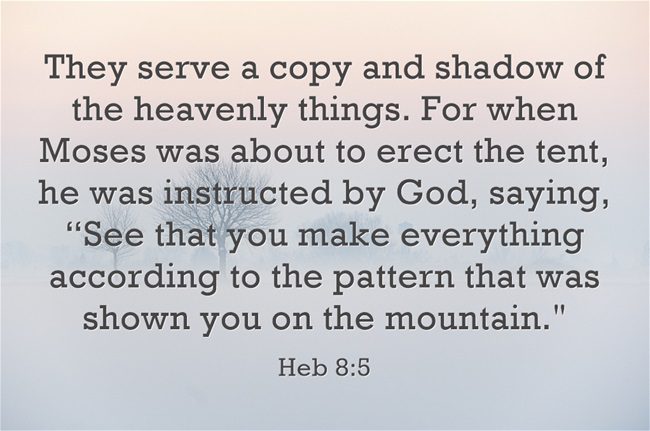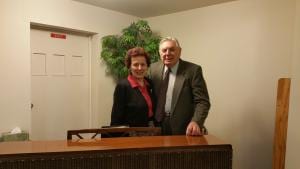Here is a Bible study, commentary, and summary of Hebrews chapter seven.
Hebrews 8:1-2 “Now the point in what we are saying is this: we have such a high priest, one who is seated at the right hand of the throne of the Majesty in heaven, a minister in the holy places, in the true tent that the Lord set up, not man.”
If you are praying for an urgent need, perhaps a life or death situation, then you’d do no better than to go all the way to heaven and the throne room of God the Father. Our “minister in the holy places” of the very temple of God gives us access to the God of the Universe. The “throne of the Majesty in heaven” was not available to us (Isaiah 59:2) until Christ ended our separation by His life, suffering, death, and resurrection.
Who is “the Majesty” in Hebrews 8:1?
Do you think there’s a literal temple in heaven?
Explain why you think so or why you don’t think so.
Hebrews 8:2-3 “For every high priest is appointed to offer gifts and sacrifices; thus it is necessary for this priest also to have something to offer. Now if he were on earth, he would not be a priest at all, since there are priests who offer gifts according to the law.”
The first thing to notice is that the high priest is appointed to offer the gifts and sacrifices. He didn’t do it just because he felt like it. It was a necessary reminder of just how deadly sin is. High priests could never enter the temple until they had first made a sacrifice and had previously made a sacrifice for their own sins. The point is; sin is costly. It requires a price. It’s a bloody ordeal. Sin brings death (Rom 6:23), just like it did to the innocent animals who were sacrificed. Sin hurts much more than just the sinner. It can draw “friendly fire” to those who live and work around them and they can suffer from some of the consequences that the one who sinned does.
How can one person’s sin hurt others?
What is the application for today where priests had to bring offerings?
Why couldn’t the priest come into the temple empty handed?
Hebrews 8:5-6 “They serve a copy and shadow of the heavenly things. For when Moses was about to erect the tent, he was instructed by God, saying, “See that you make everything according to the pattern that was shown you on the mountain.” But as it is, Christ has obtained a ministry that is as much more excellent than the old as the covenant he mediates is better, since it is enacted on better promises.”
Why would a copy or shadow be important to Israel and to us? The truth is, “if that first covenant had been faultless, there would have been no occasion to look for a second” (Heb 8:7), but it wasn’t the covenant that was wrong but the covenant breakers that brought the necessity for a new and exceedingly better covenant. This covenant would be sealed by the shed blood of Christ, so the ministry of Christ is infinitely better than the old covenant.
What was the problem, if any, with the old covenant?
What makes the new covenant better?
Why was the pattern of the temple important?
Hebrews 8:8-9 “Behold, the days are coming, declares the Lord, when I will establish a new covenant with the house of Israel and with the house of Judah, not like the covenant that I made with their fathers on the day when I took them by the hand to bring them out of the land of Egypt. For they did not continue in my covenant.”
The author of Hebrews is quoting Jeremiah who wrote, “Behold, the days are coming, declares the LORD, when I will make a new covenant with the house of Israel and the house of Judah” (Jer 31:31) and “I will put my law within them, and I will write it on their hearts. And I will be their God, and they shall be my people” (Jer 31:34). It appears that the days that were coming have now come; at least for some. God has saved a few Jews, called Messianic Jews. God has always preserved at least a remnant for Himself.
In what ways did Israel not continue in God’s covenant with them?
Have those days that were declared to be coming, arrived?
Are the house of Israel and the house of Judah different nations?
Hebrews 8:10 “For this is the covenant that I will make with the house of Israel after those days, declares the Lord. I will put my laws into their minds, and write them on their hearts, and I will be their God, and they shall be my people.”
Every person who’s trusted in Christ has had heart surgery. God had to remove the stony heart and replace it with a heart of flesh. Ezekiel wrote about a coming day where God said, “I will give you a new heart, and a new spirit I will put within you. And I will remove the heart of stone from your flesh and give you a heart of flesh” (Ezk 36:26). The great thing about a heart of flesh is that God can write on it a lot easier than He can on stone…and in this case, He writes His own law on our hearts. This causes our hearts to willingly yield to Him and live lives of obedience. You can’t write on stone very well. The final fulfillment of this day will bear righteous fruit in the kingdom as “they shall not teach, each one his neighbor and each one his brother, saying, ‘Know the Lord,’ for they shall all know me, from the least of them to the greatest” (Heb 8:11), meaning that the knowledge of God would be as common as your next door neighbors. That’s not quite the case today.
Is Hebrews 8:10 completely or partially fulfilled today?
Who is the One Who initiates the heart transplant?
What does it mean by having the law written on our hearts?
Summary
The main point of this chapter is the sufficiency and permanency of the new covenant, written in blood by the Lamb of God. The old covenant was a shadow of the greater and perfect new covenant. The perfection of the covenant is because of the Perfect Christ, the ever-living and ever-interceding High Priest Who had to enter but once into the Holy of Holies with His own blood (Heb 9:12). By Christ, “he makes the first one obsolete. And what is becoming obsolete and growing old is ready to vanish away” (Heb 8:12) so that those who trust in Him will never vanish away (Joh 3:16).
Article by Jack Wellman
Jack Wellman is Pastor of the Mulvane Brethren Church in Mulvane Kansas. Jack is also the Senior Writer at What Christians Want To Know whose mission is to equip, encourage, and energize Christians and to address questions about the believer’s daily walk with God and the Bible. You can follow Jack on Google Plus or check out his book Teaching Children the Gospel available on Amazon.
















